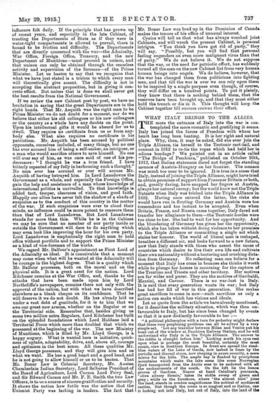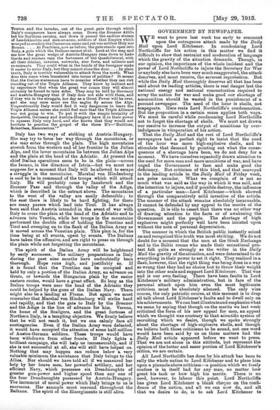WHAT ITALY BRINGS TO THE ALLIES.
THE more the entrance of Italy into the war is con- templated the more romantic and gratifying it seems. Italy has joined the forces of Freedom with whom her
heart has long been beating. It is her right and natural
place. Why, then, it may be asked, did she ever join the Triple Alliance, tie herself to the Teutonic cart-tail, and consent in 1912 to re-tie the ropes which had held her in odious bondage ? We pointed out in an article called "The Bridge of Peschiera," published on October 26th, 1912, that Italian statesmen dared not forget the standing menace of Austria-Hungary on her frontier. The menace was much too near to be ignored. It is true in a sense that Italy, instead of joining the Triple Alliance, might have tried to obtain promises of support from France or Britain or both, and, greatly daring, have snapped her fingers at Austria, always her natural enemy; but the world knew not the Triple Entente when Italy was tricked into the Triple Alliance in 1882. Having once entered the latter, the risks she would have ruu in flouting Germany and Austria were too tremendous and too instant to be accepted. Even when Britain, France, and Russia came together, Italy dared not transfer her allegiance to them—the Teutonic hordes were too close to her. She bad to wait for her opportunity. And the blundering of Germany has given her the opportunity, which she has taken without doing violence to her promises to the Triple Alliance or committing a single act which stains her honour. The world of liberal men is reshaped, breathes a different air, and looks forward to a new future, now that Italy stands with those who assert the cause of countries which desire to live their own life and cultivate their own nationality without a hectoring and crushing dicta- tion from Germany. No reflecting man can believe for a moment that Italy has come in because she thinks it worth while to plunge her homes in mourning for the capture of the Trentino and Trieste and other territory. Her motives are far wider and purer. They are the motives of Garibaldi, Mazzini, and Cavour. There is no war-lust in Italy. It is said that every generation wants its war; but Italy has had her fill of war in this generation. She makes great sacrifices to come in now—such sacrifices as only a nation can make which has visions and ideals.
Let us quote from the article we have already mentioned, for it describes the military situation, which was then un- favourable to Italy, but has since been changed by events so that it is now distinctly favourable to her :— "A political philosopher with a turn for pedantry might declare that these very perplexing problems can all be solved by a very simple act. 'Let any traveller between Milan and Venice put him head out of the window at Peachier. Railway Station, and he will understand why Italy is in the Triple Alliance. The answer to the riddle is straight before him.' Looking north his eyes rest upon what is perhaps the most beautiful, certainly the most scenic, view in Southern Europa In front are spread the steel- blue waters of the Lake of Garda, now lashed is foam by the periodic and diurnal storm, now sleeping in azure security, a mere mirror for the hills. The ample bay is flanked by precipitous mountains which make the lake seem like some Norwegian fjord transported from the Arctic) seas to be endowed with all the enchantments of the south. On the left lie the lemon groves of Gardena. Nearer at band Catalina's peninsula. 'olive silvery Sirmio,' takes its sickle sweep of green and grey ; while on the foreshore, where 'the almost islet' joins the land, stands in sombre magnificence the noblest of mediaeval castles. But though the scene is so magical and so Italian, one is looking not into Italy, but out of Italy, into the land of the Teuton and the invader, out of the great gate through which Italy's conquerors have always come. Down the Brenner Attila led his Scythian cavalry, and down it passed the endless stream of Landsknechta and men-at-arms, soldiers of that Empire which usurped so crudely the Caesarean name and yet was neither Holy nor Boman.. . At Peschiera, now as before, the gate stands open into Italy, a gate which the Italians cannot shut. Look at the map and see how the groat wedge of Austria-Hungary runs down to Lake Garda and renders vain the fortresses of the Quadrilateral, with all their ditches, ravelins, outworks, star forte, and saliente and re-entranta They could when in the hands of the foreigner make it easier to enter Italy, but they cannot close the door.... In plain truth, Italy is terribly vulnerable to attack from the north. What does this mean when translated into terms of politics ? It means that the Italian statesmen have to consider whether they can risk standing out of the Triple Alliance. They know by instinct and by experience that when the great war comes they will almost certainly be forced to take aides. They may be told by Germany and Austria-Hungary that if Italy does not aide with them, and if they win in the struggle, her day as a Great Power will be over, and she may once more see the eagles fly across the Alps. Unquestionably Italy would find it very dangerous to leave the Triple Alliance unless she could feel sure that the Triple Alliance was not going to win. To put it with the simple brutality of Eselpolitik, Germany and Austria-Hungary have it in their power to squeeze Italy very hard, and she knows that they would not hesitate to practise the gospel of the three It's—`Ruthless, Relentless, Remorseless.'"
Italy has two ways of striking at Austria-Hungary. She may try to force her way through the mountains, or she may elites through the plain. The high mountains stretch from the western end of her frontier to the Julian Alps, and the lower mountains lie between the Julian Alps and the plain at the head of the Adriatic. At present the chief Italian operations seem to be in the plain—across the Isonzo, in the direction of Istria—but we must not suppose for a moment that Italy will be allowed to escape a struggle in the mountains. Marshal von Hindenburg is said to be in command of the troops which will attack Italy. He will probably come by Innsbruck and the Brenner Pass and through the valley of the Adige, which is described in the extract above. The mountains to the west of the valley are easily defensible ; to the east there is likely to be hard fighting, for there are many passes which lead into TiroL It has always been said that Austria intended in the event of war with Italy to cross the plain at the head of the Adriatic and to advance into Venetia, while her troops in the mountains performed the double office of holding the Trentino and Tirol and sweeping on to the flank of the Italian Army as it moved across the Venetian plain, This plan is, for the time being at all events, upset by events. The Italians have taken the offensive, and are right to press on through the plain while not forgetting the mountains.
The spirit of the Italian Army will be heightened by early successes. The military preparations in Italy during the past nine months have undoubtedly been thorough. Hope runs high, and justifiably so. If it is found that the Trentino can be occupied and held by only a portion of the Italian Army, an advance on Gratz, or towards the Hungarian plain by the easier eastern routes, would have a great effect. So long as the Italian troops were near the head of the Adriatic they could be helped by the guns of the Italian Navy. There might also be a landing at Fiume. But again we must remember that Marshal von Hindenburg will strike hard and rapidly, and that the gate to Italy by the Brenner and the Adige is the line of advance for him. Verona, the home of the Scaligere, and the great fortress of Northern Italy, is a tempting objective. We firmly believe that he will not reach it, but we can calmly face all contingencies. Even if the Italian Army were defeated, it would have occupied the attention of some half-million of Austro-German soldiers. These troops would have been withdrawn from other fronts. If Italy fights brilliant campaign, she will help us immeasurably, and if she is not successful at all, she will still have helped us. Nothing that may happen can reduce below a very valuable minimum the assistance that Italy brings to the Allies. Nor should we have told all if we measured her help by her brave men, her powerful artillery, and her efficient Navy, which possesses six Dreadnoughts of greater gun-power and higher speed than any one of the four Dreadnoughts possessed by Austria-Hungary. The increment of moral power which Italy brings to us is enormous. Her example must resound throughout the Balkans. The spirit of the Risorgimento is still alive.



































 Previous page
Previous page